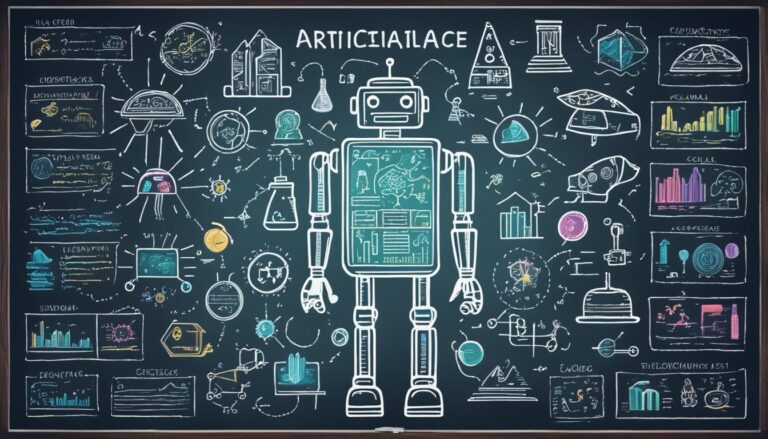Artificial Intelligence (AI) is changing how we shop online. It makes shopping more-personal through smart recommendations. Operations become smoother and choices smarter. In 2020, e-commerce sales hit $4.28 trillion worldwide. This shows how fast the sector is growing. AI helps in many ways. It suggests products, offers chat support, detects fraud, and manages stock.
Using AI in e-commerce makes customers happier and boosts sales. It also increases how well businesses run. Better decisions come from analysing data. But, using AI can raise issues with keeping customer data safe and secure.
Introduction to AI in E-commerce
Artificial Intelligence (AI) makes shopping online smarter. It acts like a human, learning and adapting. This tech helps online shops make quick, smart decisions. Global e-commerce sales hit $4.28 trillion in 2020, showing massive growth. Companies now use AI to improve their strategy and performance. AI improves e-commerce by personalizing shopping, managing stock with predictions, and boosting efficiency. This all leads to better service on shopping sites.
AI changes how shops offer personal experiences to customers. E-commerce sites use AI to learn what customers like. This leads to personalized suggestions, happier customers, and more sales. AI helps shops manage stock better too. It predicts what will sell, ensuring popular items are always available. This cuts costs and reduces the chance of running out of stock.
AI isn’t just about selling products. It also improves customer service with chatbots and virtual assistants. These systems can answer questions and help customers instantly. This makes shopping smoother. Customers get recommendations, solve problems, and buy things easier than ever before.
AI also helps businesses work better and plan smarter. By analyzing data, companies understand customers and trends. They make smarter pricing and marketing choices. AI can also reveal why customers may leave. This lets businesses keep customers longer and increase their value.
The Power of AI in E-commerce
AI is changing online shopping in big ways. It gives companies tools to offer personal shopping, work smarter, and make choices based on data. With AI, businesses can keep up in the fast-moving online market.
Table: Applications of AI in E-commerce
| Application | Description |
|---|---|
| Personalized Product Recommendations | AI algorithms analyze customer data to provide tailored product recommendations, enhancing the shopping experience. |
| Chatbots and Virtual Assistants | AI-powered chatbots and virtual assistants offer instant and personalized customer support, improving communication efficiency. |
| Fraud Detection and Prevention | AI algorithms detect fraudulent activities and prevent them in real-time, ensuring secure transactions. |
| Optimized Inventory Management | AI analytics predict demand patterns and optimize inventory levels, minimizing stockouts and reducing costs. |
| Dynamic Pricing Strategies | AI algorithms analyze market conditions and competitor prices to optimize pricing strategies for maximum profitability. |
| Customer Churn Prediction | AI analyzes customer data to identify churn patterns and implement targeted retention strategies. |
| Generative AI for Content Creation | AI-powered generative models create engaging and personalized content, attracting and retaining customers. |
AI in e-commerce is a game-changer. It brings personalized experiences, improves efficiency, and supports data-driven choices. With AI’s power, businesses lead the market and give customers great shopping experiences.
Common Applications of AI in E-commerce
Artificial Intelligence (AI) has changed the way we shop online, making things easier and faster. AI helps businesses understand their customers better and make smart decisions. Here are some ways AI is used in e-commerce:
1. Personalized Product Recommendations
AI looks at what you’ve looked at or bought before to suggest new items you might like. This helps e-commerce sites give you a shopping experience just for you. It makes customers happy and boosts sales.
2. Chatbots and Virtual Assistants
Need help while shopping online? AI-powered chatbots and virtual assistants are there any time you need them. They answer your questions and help you through your purchase. This makes shopping online easier and keeps customers coming back.
3. Fraud Detection and Prevention
To keep shopping safe, AI spots and stops fraud on e-commerce sites. It looks for unusual activity that might mean someone is trying to cheat. This protects both the shop and the shopper.
4. Optimized Inventory Management
AI helps shops manage their stock better, avoiding too much or too little. By predicting what will be in demand, it helps keep the right amount of stock. This makes everything run smoother.
5. Dynamic Pricing Strategies
With AI, prices can change based on how much people want an item and what the competition is doing. This helps shops make more money while staying competitive.
6. Customer Churn Prediction and Retention Strategies
AI can tell when a customer might stop shopping with a business. This lets the business try to keep the customer by offering special deals or services. It helps keep customers loyal and reduces lost sales.
7. Generative AI for Content Creation
Need to write product descriptions or ads? AI can do that, making it easier and quicker to create content that draws customers in. This saves time and ensures everything sounds just right.
AI has a big impact on online shopping, from improving how we buy things to keeping our data safe. By using AI, e-commerce businesses can offer better services and stay ahead in a competitive market.
Benefits of Using AI in E-commerce
AI in e-commerce adds huge benefits for businesses. It improves how they work and connect with customers. These advantages touch every part of the online shopping world. They enhance customer interaction, boost how well businesses run, and make decision-making better.
Personalized Shopping Experiences
AI lets companies offer shopping that’s tailored to what each customer likes and needs. By looking at customer data, AI tools can suggest products that match what customers have liked before. This makes shoppers happier, more engaged, and often leads to more sales.
Predictive Analytics for Increased Revenue
Using AI in e-commerce is great because it can predict what customers will want. It looks at lots of data to see trends, helping businesses know what to sell. This means they can adjust what they offer and how they market it, leading to more sales and profits.
Improved Operational Efficiency
AI makes e-commerce operations smoother by handling tasks automatically. It reduces mistakes and saves money. For example, AI helps manage inventory by predicting what will be in demand. AI chatbots also offer 24/7 customer help, making things more efficient and easing the load on staff.
Data-Driven Decision-making
AI’s real advantage in e-commerce is its quick data analysis. It gives insights into trends and customer needs. These insights help businesses decide on prices, marketing, and new products. With AI, companies stay competitive, adapt quickly, and make smart decisions for success.
Adding AI in e-commerce gives businesses a big advantage online. It makes shopping more personal and fun, makes operations smoother, and helps with smart decisions. By using AI, companies can grow, build stronger customer ties, and excel in the ever-changing e-commerce scene.
Challenges of Implementing AI in E-commerce
Implementing AI in e-commerce has big benefits, but it’s not easy. There are several hurdles to overcome for AI to work well. These must be carefully managed for successful AI use.
Data Privacy and Security
Data privacy is a big worry with AI in e-commerce. Lots of user data is involved. It’s vital to keep this data safe. E-commerce companies need to follow strict rules and have strong security.
Skilled Professionals
Finding the right people is another challenge. You need experts who know e-commerce and AI. These experts are tough to find and keep. Companies should focus on training and developing their staff.
Integration into Existing Infrastructure
It can be hard to fit AI with what companies already have. AI has to work with the current systems. Sometimes, this means changing or updating old systems to get the most from AI.
Ethical Considerations
AI’s ethics in e-commerce also matter. AI makes automatic decisions, which can raise issues. Concerns like fairness and bias need addressing. Businesses must aim for fair and responsible AI use.
Despite these challenges, they can be beaten. With good planning and effort, these obstacles can be navigated. Focusing on key areas like privacy, skilled staff, seamless integration, and ethics will help. This lets e-commerce companies fully use AI to do better in the digital world.
AI in E-commerce: The Future Is Now
Artificial Intelligence (AI) is changing e-commerce greatly. It’s making online shopping evolve and shaping its future. The global AI market is set to grow massively, expected to hit a whopping £45.72 billion by 2032. This growth shows just how much AI can change e-commerce.
AI helps online shops offer personalized shopping experiences. It learns what each shopper likes and suggests products they’ll love. This makes customers happy and boosts sales.
AI’s role in e-commerce will go beyond just suggesting products. New tech, like machine learning and image recognition, will expand what online stores can do. For example, customers might try clothes on virtually or see how furniture looks in their room. This will help bridge the gap between shopping online and in physical stores.
Predictive shipping is another exciting AI feature. It will let online stores predict what customers want, ensuring products arrive on time. This will be key for keeping customers happy.
Soon, we could see smart virtual shopping assistants. They’ll offer tailored advice and help throughout the shopping process. This will make shopping faster, easier, and more fun.
AI is the future of e-commerce. Companies using AI will offer better shopping experiences and stay ahead of the competition. As AI improves, it will bring endless opportunities to enhance online shopping.
Blending AI for Online Stores
When adding AI to online shops, it’s key to pick tasks and goals carefully. Figuring out how AI can make customer chats better, speed up work behind the scenes, and boost efficiency is important. AI in e-commerce brings many benefits like tailored shopping and better product images.
Finding the right AI platform is key for e-commerce success. Businesses need to check what each platform offers and if it can grow with them. Everyone in the team should have a say, and getting advice from experts is a smart move for smooth setup.
Using AI, online shops can offer unique experiences and work more efficiently. Algorithms that understand customer likes can suggest just the right products. This makes shoppers happier and can increase sales. AI also makes managing stock, orders, and customer help faster, cutting down costs.
AI is great for ads that speak directly to the shopper’s needs. It uses customer info and AI to make marketing very focused, increasing sales and saving money on ads.
AI also powers tools that let shoppers find what they want by just uploading a picture. This makes shopping easier and more fun, and helps people buy more smoothly.
The Potential of AI in Customer Service
AI chatbots and helpers are becoming popular in online shops for their good and personal customer help. They can take on many tasks, from suggesting products to fixing common problems quickly. This means better and faster help for customers any time they need it.
Adding AI to online stores helps businesses use data for making smart choices. By understanding what customers like and buy, AI helps shape marketing, stock needs, and new products.
To really make AI work in e-commerce, businesses must plan well and keep improving their AI tools. Staying up to date with AI tech gives shops an edge and meets shopper demands in new ways.
Conclusion
AI has changed e-commerce, making shopping more personal and improving how companies work. It has led to happier customers, more sales, and better efficiency. But we must not forget the problems, like keeping data safe.
The future of AI in e-commerce looks promising. With new developments in tech, the industry will continue to grow. Using AI helps companies stay ahead in the online market.
As AI gets better, it will make shopping online even smoother and help businesses grow. By using AI, companies can offer unique and quicker shopping experiences. This ensures they keep succeeding.
FAQ
What is AI in e-commerce?
AI in e-commerce involves smart machines that act like humans. They learn and adjust to make shopping better.
What are the common applications of AI in e-commerce?
AI helps in many ways, like suggesting products and providing help through chatbots. It also spots fraud, manages stock, sets prices, predicts customer loss, and creates content.
What are the benefits of using AI in e-commerce?
AI boosts the shopping experience, leading to more sales. It also helps businesses operate better and make smarter decisions.
What are the challenges of implementing AI in e-commerce?
Introducing AI has hurdles such as keeping data safe and needing skilled staff. It must also fit with current tech and be used ethically.
What does the future hold for AI in e-commerce?
AI is evolving swiftly, improving user experiences and enabling new features. Future trends include better visuals and clever shopping assistants.
How can AI be blended into online stores?
To add AI to online stores, aim for clear goals. Think about enhancing customer service and streamlining tasks. Selecting the right AI platform that fits your needs is vital.


















